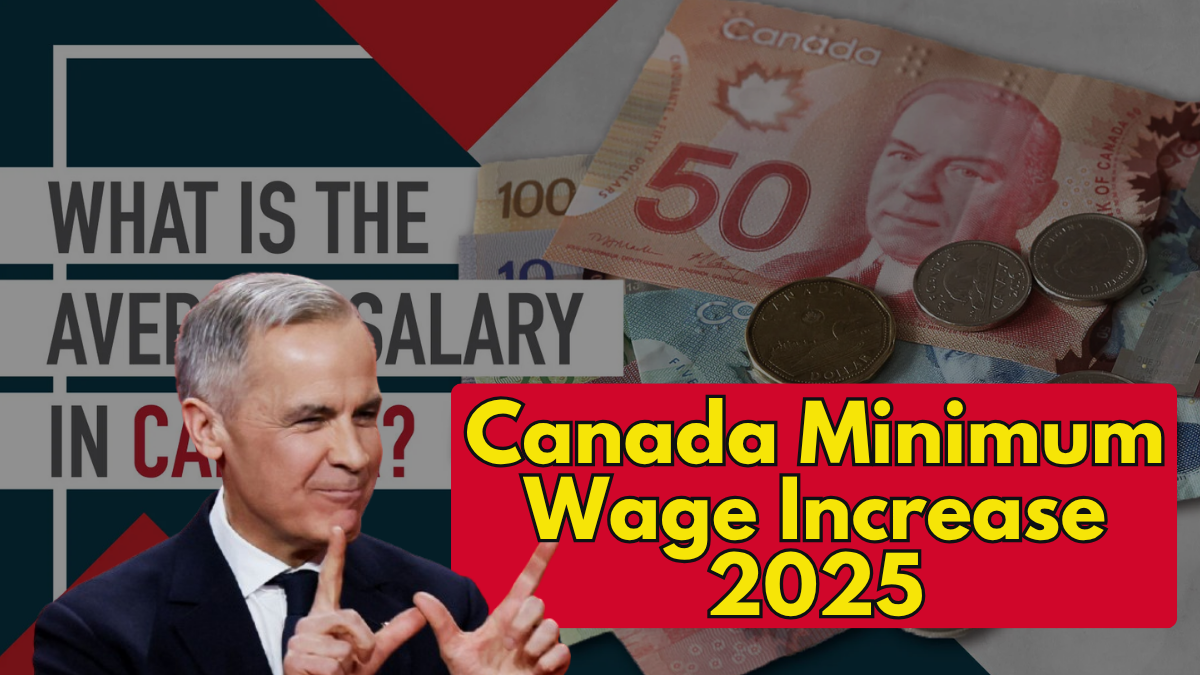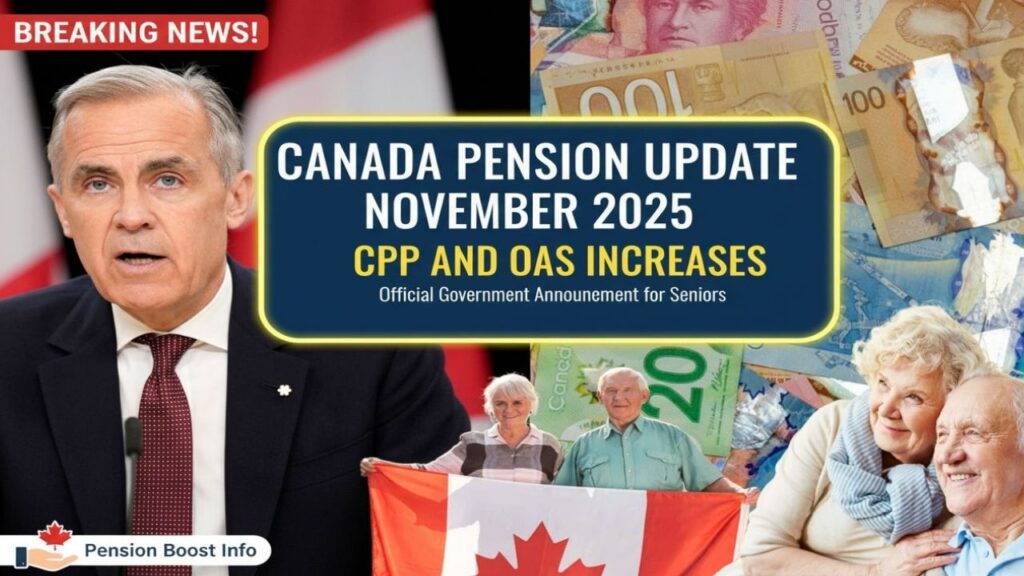Canada’s minimum wage rules are changing across multiple jurisdictions in 2025 to address inflation and support worker purchasing power. This guide consolidates the latest federal, provincial, and territorial rates, highlights who is covered, and explains when changes hit your paycheck. It also includes a quick vertical summary table, FAQs, and an official government link for authoritative references.
Table of Contents
Federal Minimum Wage 2025

- Effective 1 April 2025 the federal minimum wage is $17.75 per hour.
- Applies to employees in federally regulated industries such as banking, telecommunications, and interprovincial or international transportation.
- Higher standard applies rule: if the province or territory where the employee works has a higher minimum wage, employers must pay the higher rate.
Summary Table
Item |
Details |
|---|---|
What is changing |
New federal, provincial, and territorial minimum wages in 2025 |
Federal rate from 1 April 2025 |
$17.75 per hour for federally regulated sectors when higher than local rate |
Where the highest rate is |
Nunavut at $19.75 per hour from 1 September 2025 |
Who is covered |
Most employees 16 and older, including part time and temporary staff, subject to local exemptions |
When updates take effect |
On each jurisdiction’s effective date listed below and reflected in the next payroll cycle after that date |
What workers should do |
Check effective dates, verify pay stubs, and raise discrepancies promptly |
Official website |
Provincial and Territorial Minimum Wage Rates in 2025
Below are the 2025 headline rates and effective dates. Where a special note is provided, it reflects distinctive rules for that jurisdiction.
Alberta
- General minimum wage: $15.00 per hour.
- Status: Unchanged since 2018. No announced 2025 increase.
British Columbia
- General minimum wage: $17.85 per hour from 1 June 2025.
- Online platform workers: Minimum $21.43 per hour during engaged time for delivery and ride hail work.
Manitoba
- General minimum wage: $16.00 per hour from 1 November 2025.
- Annual review remains aligned with the province’s review process.
New Brunswick
- General minimum wage: $15.65 per hour from 1 April 2025.
- Overtime: 1.5 times regular rate for hours beyond 44 in a week.
Newfoundland and Labrador
- General minimum wage: $16.00 per hour from 1 April 2025.
- Future adjustments planned to track the Consumer Price Index.
Nova Scotia
- Two step path in 2025:
- $15.70 per hour from 1 April 2025
- $16.50 per hour from 1 November 2025
Nunavut
- General minimum wage: $19.75 per hour from 1 September 2025.
- Highest rate in Canada, reflecting higher living costs in the territory.
Ontario
- General minimum wage: $17.60 per hour from 1 November 2025.
- Homeworkers: $19.35 per hour from the same date.
- Special categories: Distinct rules apply for students under 18 and liquor servers.
Prince Edward Island
- General minimum wage: $16.50 per hour from 1 November 2025.
- Scheduled: Increase to $17.00 on 1 April 2026.
Quebec
- General minimum wage: $16.10 per hour from 1 May 2025.
- Tipped employees: $12.90 per hour from the same date.
Saskatchewan
- General minimum wage: $15.35 per hour from 1 November 2025.
- Follows the increase to $15.00 that took effect on 1 November 2024.
Northwest Territories
- General minimum wage: $16.95 per hour from 1 September 2025.
- Annually adjusted with reference to the CPI for Yellowknife and the territorial average hourly wage.
Yukon
- General minimum wage: $17.94 per hour from 1 April 2025.
- Annual adjustments tied to CPI for Whitehorse.
Eligibility and Coverage in 2025
- Who is covered: Most employees aged 16 and older, including full time, part time, seasonal, and temporary workers.
- Exclusions and special rates: Some jurisdictions maintain distinct rates or rules for categories such as students, liquor servers, homeworkers, tipped employees, and specific agricultural or live in roles.
- Federally regulated workers: Covered by the federal standard unless the local minimum wage is higher, in which case the higher local rate applies.
Action for workers: Confirm which jurisdiction applies to your job, as your location of work and industry determine the correct minimum wage. If you are in a special category, verify the correct rate for that category.
Payment Schedule and When You Will See the Increase
- Effective date to paycheck: Your new rate should appear in the first pay period that includes the jurisdiction’s effective date or immediately after, depending on your employer’s payroll cutoffs.
- Back pay: Employers do not generally owe retroactive adjustments for hours worked before the effective date.
- Overtime: Overtime thresholds and multipliers vary by province or territory. Where noted, rules like time and a half after a weekly threshold apply.
Action for employers: Update payroll configurations before the effective date, including special categories, tip differentials, vacation accruals, and overtime multipliers that compute from the base rate.
How To Check Your Pay and Resolve Issues
- Verify your hourly rate: On or after the effective date, confirm the rate shown on your pay stub against your province or territory’s new rate.
- Check category: If you are a homeworker, student, liquor server, or tipped employee, ensure your special rate is correct.
- Flag discrepancies quickly: Raise concerns with HR or payroll in writing and keep a copy.
- Escalate if needed: If the issue is not corrected, contact your province or territory’s employment standards office for guidance and complaint options.
Practical Tips for Workers and Employers
For workers
- Track hours precisely, including overtime and statutory holidays.
- Keep copies of job offers and pay change notices.
- Note effective dates in your calendar to check the first qualifying pay run.
For employers
- Audit all employee categories and locations.
- Train managers on scheduling and overtime to avoid accidental non compliance.
- Communicate rate changes to staff before the first affected pay period.
Frequently Asked Questions
1. I work in a federally regulated job. Which rate applies
The federal rate is $17.75 from 1 April 2025. If your province or territory’s minimum wage is higher, your employer must pay the higher rate.
2. When will my paycheck reflect the new rate
In the first payroll that includes or follows your jurisdiction’s effective date. If your pay stub does not reflect the change, contact payroll immediately.
3. I am a tipped worker in Quebec. What is my minimum wage
From 1 May 2025 the tipped minimum is $12.90 per hour. Your tips are in addition to that minimum.
4. I am a homeworker in Ontario. What is my rate from November 2025
The homeworker minimum wage is $19.35 per hour from 1 November 2025.
5. What if my province’s rate is lower than the federal rate
If you are not in a federally regulated industry, your employer follows the provincial or territorial rate. If you are federally regulated, you get the higher of federal or local.
6. Do the increases apply to part time and temporary workers
Yes. Minimum wages generally apply to most employees regardless of full time or part time status, subject to specific local exemptions.
7. How is overtime handled
Overtime rules differ by jurisdiction. Example: New Brunswick specifies 1.5 times the regular rate after 44 hours in a week. Check your local standards for precise thresholds.
Conclusion
The 2025 minimum wage updates aim to protect worker incomes amid higher living costs. Knowing which rate applies, when it takes effect, and how to verify your pay ensures you receive the correct compensation. Employers should finalize payroll updates ahead of each effective date, and employees should review the first impacted pay stub carefully. When in doubt, consult your province or territory’s employment standards or the federal guidance for federally regulated sectors.
Official Website
For authoritative federal and provincial or territorial employment standards, visit https://www.canada.ca
For More Information Click HERE










